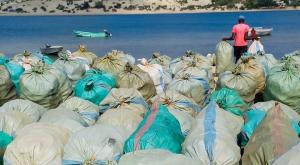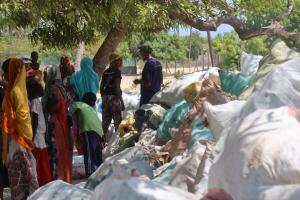Fanya Safi Waste Coalition – Final Report
At the end of April, Takataka Heroes (TTH), Shela Environmental Residents Group (SERG) and Manda Taka Project (MTP) finished their 6-month Fanya Safi Waste Coalition project.
Over 6 months, the three groups created a strong coalition of waste collectors across Manda Island, Shela Village and Lamu Town. As each of the groups had differing levels of experience, understanding and approaches toward waste collection the groups learnt a lot from each other and in taking part in this project.
The project objectives were as follows:
- Create a unified and sustainable waste management system to promote the collection of recyclable materials and start recycling on Lamu.
- Continuing conversations with the county government and municipality to encourage support and greater intervention regarding waste management to ensure greater environmental protection and work out ways to reduce plastic importation and use within the archipelago.
- Engage the community to raise awareness of the issues of plastic pollution and to encourage an overall reduction of plastic items and single-use items.
- Collect and process 25 tonnes of plastics.
The project aimed to reach those objectives by the following outputs:
- Regular deliveries of recyclable waste from SERG and MTP sites to the TTH site.
- Community collections of plastic using the innovative TTH ‘Okota Plastiki’ method.
- Making site improvements to MTP and TTH sites for more efficient working.
- Hiring extra staff members for all organisations.
- Starting production of recycled products for sale by TTH to create sustainability of the project.
- Continuing conversations with government officials to create a sustainable waste management system.

At the end of the project the coalition achieved the following:
- Site improvements were made to the MTP site in the form of better fencing and the zoning of areas for sorting waste. While TTH built a washing area for the processing and recycling of plastic.
- A total of 13 people were hired for the delivery of the project.
- Training was provided by the TTH team to all the groups to create a better understanding of the different types of plastic including what can and can’t be recycled.
- Monthly deliveries of recyclable waste to the TTH site totalled nearly 10 tons.
- TTH collected nearly 26 tons of plastic through their Okota Plastiki collections where they purchased plastic from the community at KES 12 per kilo.
- A total of 35,322 Kg (35 tons) of plastics were collected in 6 months.
- Approximately 250 people took part in these collections raising greater awareness of the need for better waste management.
- Members of all groups took part in multiple discussions with the Lamu Municipality to create a sustainable waste management system. Many of the suggestions made by the groups were considered and written into the final report of recommendations.
Changes to the initial proposal
- Due to the formation of a new partnership between TTH and The Flipflopi Project, TTH did not begin creating recycled products for sale. This was because The Flipflopi Project agreed to take on all R&D with regard to plastic recycling and be responsible for the manufacturing of plastic products. The Flipflopi Project would then purchase the collected plastic to create sustainability for the project.
- MTP was unable to undertake regular community clean-ups due to a lack of management capacity. The funds that were set aside for this went towards the increased costs of transport and Okota Plastiki collections.
Challenges while undertaking the project:
- Due to this being the first time that multiple organisations came together to collect waste, it took a few months to find a good working relationship.
- High transport costs were a continued issue for all organisations. This is due to all organisations having to rely on transport as a service and the limitations of working on different islands and there being no roads.
- Budget constraints were also an issue specifically for TTH who were conducting the community buy-outs as it was hard to estimate how much plastic the community would collect. In reality, the team massively underestimated the appetite for these collections as the group continue to receive calls from community members for collections yet the group are unable to collect.

Recommendations moving forward:
- To involve the community in the world of circular economy and educate them on the importance of conserving our environment it’s important to incentivize plastic collection. The Okota Plastiki campaign attracted so many participants, especially youths and women which shows that with desirable incentives, people will commit to community conservation.
- The problem of plastic pollution is so huge that it cannot be tackled by one organization. Therefore, it’s important for organisations that are dealing to come together to conserve the environment.
- It’s important to engage relevant stakeholders in addressing key issues that affect the environment. Organisations should not try to compete with the authority but try to work alongside.
- It’s important to continue buying plastics from the community as this provides vital supplementary income.
- Environmental groups around Lamu should come together when performing clean-ups to ensure waste is properly managed after it is collected.
Next steps:
- Since the commencement of the project, the organisations working within the waste management sphere have shifted with The Flipflopi being a major player and buyer of plastic waste. All organisations are working with The Flipflopi now to create a working partnership and aid in the creation of a sustainable open-loop waste management system in Lamu.
- While there is a lot more that needs to be done with regards to raising awareness about the problems with poor waste management, the coalition is focused on creating a strong partnership with The Flipflopi Project so isn’t initially seeking further funds from LEF immediately. However, the coalition are still working closely together so possibilities for further funding and new projects are possible in the future.
